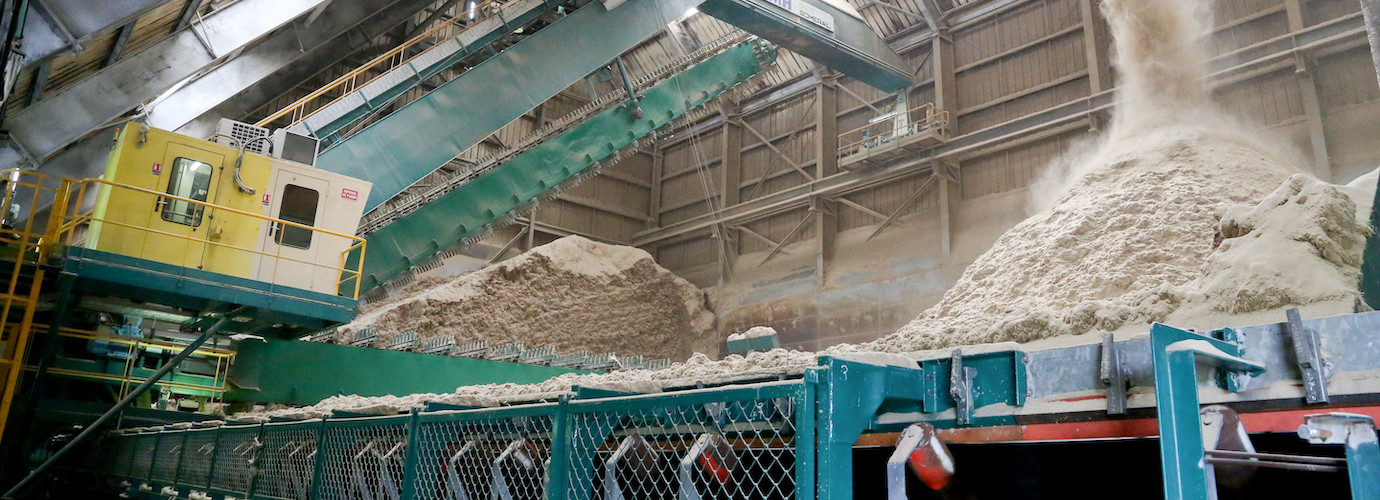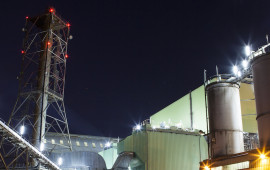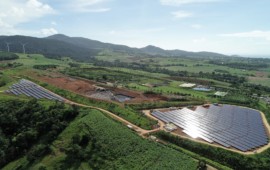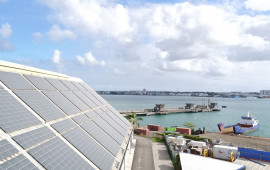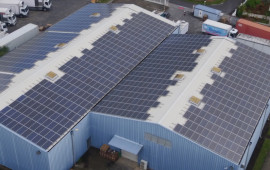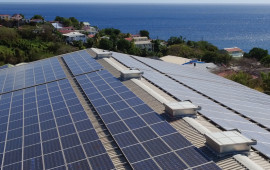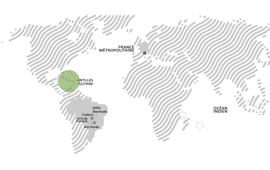
- Energy: Biomass and solar
- Installed since: 1998
- Installed power capacity: 102 MW
- Installed solar capacity: 4,5 MWp
Since 1998, Albioma has contributed to the energy autonomy of Guadeloupe, a territory not connected to mainland networks, by producing electricity from local biomass and photovoltaic energy.

A historic market
In Guadeloupe, Albioma operates the Le Moule thermal biomass power plant, which supplies 22% of the electricity available on the grid. In addition to bagasse, the Group is seeking to mobilise new forms of local biomass and without conflict of use outside the sugar campaigns. Since November 2020, unit 3 of the plant has operated exclusively on biomass. We are currently working on the complete conversion of the plant with the aim of completely abandoning coal on the historic cogeneration units.
Albioma has announced its plan to phase out the use of coal at its Le Moule site (ALM1 and ALM2 units) in Guadeloupe, following a decision by the French Energy Regulatory Commission (CRE)1 on 13 June 2024 and the signature of an amendment to the power purchase agreement with EDF for the conversion of the plant to biomass.
Work on converting the ALM2 unit is already under way, with the aim of having the plant running on 100% biomass by 2025, using available local biomass sources (bagasse, forest, wood, prunings, etc.), supplemented by certified imported wood pellets from sources including our production plant in Canada. The ALM1 unit will run solely on bagasse during the sugar harvest, and will be mothballed the rest of the time.
The CRE’s decision also provides for the investment required to extend the operation of the ALM2 unit by 14 years. As a result, the power purchase agreement for ALM2 has been extended from 2033 to 2047.
As stated in the deliberation, “Albioma will benefit from lessons learned from the conversion of all its other plants in French overseas departments and territories […]. In addition to this wealth of feedback information, the conversion of ALM2 and the cessation of coal use at ALM1 will enable Albioma to stop importing coal altogether and use biomass exclusively for all its steam plants in the West Indies.”
Albioma Chairman Frédéric Moyne commented: “The support of the Albioma teams will enable the conversion of the Le Moule power plant to biomass to begin immediately. This work is in response to a number of challenges, including the phasing-out of coal in Guadeloupe’s electricity production by 2025, and a subsequent increase in the proportion of renewable energy in the island’s long-term energy mix. In addition to this very good news for Guadeloupe, Le Moule had been the last remaining coal-fired power station in overseas France, so its conversion marks the end of coal in the French overseas territories, which I am particularly pleased about. These territories, which are isolated from the mainland French electricity grid, will most likely be able to deliver 100% of their electricity mix with renewable energies by 2030.”
In due course, the conversion will increase the renewable portion of Guadeloupe’s energy mix from 35% to 45%2 and will reduce greenhouse gas emissions by some 200,000 metric tons of CO2 equivalent per year; in other words, an 87% decrease in direct emissions compared with the current operation of the plant.
The Le Moule power station, which adjoins the Gardel sugar refinery, produces around 30% of Guadeloupe’s electricity. With an installed capacity of 102 MW, the plant employs 94 people and supplies steam to the sugar refinery, ensuring the long-term future of the island’s sugar cane industry.
Discover our Le Moule plant
Development of solar power
Since 2008, Albioma has been developing its solar activity in Guadeloupe. The Group currently operates four photovoltaic plants in Jarry, Sainte-Rose and Basse-Terre, all of which are located in areas with no conflict of use. For example, the Silo Jarry plant, commissioned in 2009, is installed on a roof with a steep slope and has an installed capacity of 385 KW. In 2019, new photovoltaic projects will also increase Albioma’s green energy production capacity in Guadeloupe.

